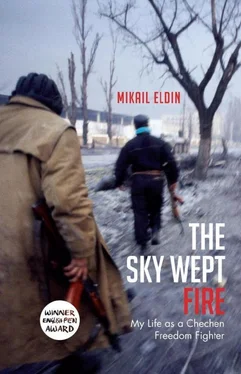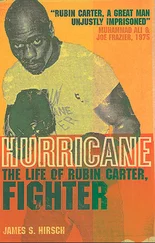I remember one I’d often encountered in this part of the city before the war. He was small and dark-haired and he used to wander about the market quietly in search of something sweet. Soft-hearted women-traders would give him free chocolate. I last saw him in January 1995. His bare feet were in slippers, he’d covered his naked body with tracksuit trousers and a jacket, and he was shivering fiercely from the cold as he walked down the devastated street. What brought him to mind was his death, which came later, in February. By then the occupation of the city was complete. In full view of passers-by, Russian OMON (Special Designation Police Detachment) paramilitaries had been savagely beating a Chechen boy of around fifteen. The entire time they were beating the boy, the swarthy drug addict was studying them in silence, spellbound. The paramilitaries knew he was a drug addict and they paid him no attention. That night he slipped into their quarters with a knife. The city had no electricity and so it was dark indoors. How he managed to steal into the badly damaged building remains a mystery. He must have known every last alley of that district, where he’d lived all his life – drug addicts usually know all the hidden nooks and corners in their locality. Once inside, he plunged the knife into the first paramilitary he encountered. He managed to knife two or three more before the petrified OMON were woken by the screams of their comrades and opened fire randomly in the pitch dark. They killed and wounded more than twenty of their own before they realized what was happening. The junkie was taken alive. After they’d tied him up, beaten him viciously and promised him ‘the most horrible death ever invented’, his adversaries began gathering their dead and wounded. At that point a seasoned colonel walked up and shot him once in the heart, quickly and painlessly. He handed the corpse over to the Chechen women: ‘Bury him decently. He may have lived like a bum. But he died like a man.’ Unfortunately his name is lost from my memory.
It was not easy to tell the attackers’ positions from the friendly ones. There was no front line as such, battles were raging across the whole city and the districts which the Russian troops could not push through were being pounded night and day. Sometimes Chechen soldiers would pass with convoys of Russian prisoners.
I often wondered why the Chechens favoured death over captivity whereas the Russian soldiers were surrendering in droves. There were reports that on just one day, 26 November 1994, seventy Russian privates and officers surrendered, while among the Armed Opposition fighters the number was still higher: 200 men. Later in December of that year an entire squadron of Russia’s elite Spetsnaz GRU (the special forces of the Main Intelligence Directorate of the General Staff) surrendered, all forty-eight men. Yet when thirty-three Chechen Army fighters encircled near the village of Alkhan-Kala [17] Alkhan-Kala is a small village not far from Grozny.
were invited to surrender, they replied with fire and were killed to a man. It was only later that I understood why, and it certainly wasn’t because every last Chechen rebel was a fearless warrior who sneered at death and spurned the shame of captivity, as the propaganda would have us believe. Among the Chechen fighters you came across all sorts, as in any conflict, though the vast majority of volunteers taking up arms were genuine patriots and courageous warriors. No, the roots of this phenomenon went far deeper. The fact is that when a Russian soldier gave himself up into captivity, he hoped not to be executed or tortured. President Dudayev had outlawed the torture and abuse of prisoners. There were, of course, cases where captured Russian soldiers were summarily executed, and I certainly wouldn’t wish to idealize all the Chechen resistance fighters. Humanity has never been short of monsters. But among the Chechen resistance such cases were in the absolute minority and never found sympathy or support among the population or the army command. Quite the reverse, the Chechen command widely employed a policy of returning captured soldiers to their mothers. This was done, of course, in the interests of propaganda, but for the soldiers released, that hardly mattered. But a Chechen fighter taken captive stood no chance of being treated with even the basic clemency usually shown to prisoners of war.
Chechen militiamen were able to capture the elite GRU troops in mid-December 1994 because the landing of this Russian reconnaissance and sabotage unit had been badly bungled. They were dropped into an area where they were completely unable to operate effectively; to reach the nearest road connecting the highlands with the capital they would have had to pass through villages where people were going without sleep day and night because of the war. And even if they had made it to the road, they’d have been powerless to stop the movement of Chechen militia forces, as there were dozens of alternative routes. The militiamen had stopped using the main highways ever since the Russian planes began zeroing in on them. What’s more, no premission intelligence had been gathered about the landing site or the area covered by the operation. So the Russians relied for intelligence entirely on data from Armed Opposition fighters, who in turn gathered this data from rumours that were growing ever more fantastical. And their command had left the unit with virtually no support on the ground. Two peasants, who had gone out to the woods to fetch firewood, discovered the Russian unit by chance. The special forces captured and held the peasants, but some local people came out in search of the missing villagers and found the unit. Alerted to the Russians’ presence, around fifteen militiamen turned up from the nearest villages of Komsomolskoye and Alkhazurovo. [18] Around seventy kilometres south-west of Grozny.
Without having the haziest idea what kind of unit this was or the number of soldiers in it, the militiamen closed in on the special forces and proposed they surrender. The militiamen told the Russians that they were surrounded, that they had several snipers, and that the Abkhaz Battalion, which never took prisoners, was on its way. They were bluffing, of course, but engaging in combat with this unit would have meant certain death. Among the militiamen was a professional hunter; he killed a couple of members of the unit with two clean shots to the head when they tried to open fire. Whereupon the Russian special forces accepted the militiamen’s story and everything was sewn up. State-of-the-art weapons were seized that hitherto had been shrouded in secrecy. There was so much booty that it had to be loaded up on carts. When the commander of the unit saw who had captured them, he wept with mortification.
For the first three days of the assault the incessant flashes and the roar of guns made sleep impossible. But with time I got used to it and learnt to sleep like a baby to the thunder of gunfire. To unwind I would go to a nearby cellar, which the owner and his two elderly neighbours were using as living quarters. They had remained in the city to guard their homes from looters. This trio left an indelible impression on me. It was a complete mystery how these unarmed men planned to shield their houses from the looters, who were frequently armed, and indeed from the Russian soldiers. Happily, though, all three survived and later made it safely out of the captured city. They were often to be found in the cellar with a bottle of something warming, which they drank with sour faces giving toasts ‘to victory’. ‘We don’t usually drink,’ they told me, ‘but here we have to tackle the stress.’ One of the trio found the bombardments terrifying: the mortar attacks and tank rounds, any kind of weapon frightened him. He preferred sitting in the cellar. But his lively elder comrade would pull rank and was constantly sending him out of the cellar on errands. The younger man would protest that he was trying to get him killed, but the elder comrade would say, ‘Your problem is that you let your fear walk ahead of you. But it’s you who should walk ahead of your fear.’ From time to time they would offer me – to help with the stress – a drink of some liqueur or wine from their stash (one had a wife who traded in alcohol before the war). They would pull long faces when I refused and shake their heads. ‘If you can cope with all this stone sober, you must be a strong man,’ they would say, in an attempt at admiration, although judging by their eyes they considered me terminally mad. Indeed, there were moments when I came close to agreeing with their unspoken opinion of me. During an air raid, one of the men’s homes was hit by a bomb, but he decided to remain with his two comrades ‘for company’, as he explained. All we had to eat were jars of tomatoes pickled in brine, unaccompanied by bread or anything else. The salty tomatoes caused intolerable thirst, but there was no water. We lived on these preserved tomatoes for so long that I’ve been unable to abide the sight of them ever since. Some time later, an item of great luxury was added to our diet: pigeons. Untold numbers of them appeared in the city. Or perhaps they had always lived there but we’d never noticed. The neighbours caught them with ingenious snares. What cruel irony: the emblem of peace became food for the pale shadows of former men who found themselves at war, once again confirming my theory about the might of man’s instincts.
Читать дальше












